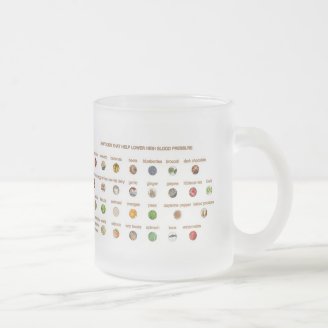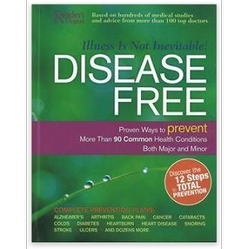I have high diastolic blood pressure, and often get quite stressed at work, so I was curious what their advice would be. I had researched hypertension and learned that a good number of foods have minerals and phytonutrients that help lower high blood pressure. But reading how an hour of fast walking, 3-5 times a week, lowers blood pressure by 5-6 points made me more determined to include that exercise every day, since it's a sure-fire way to reduce stress and hypertension. Fast walking also raises the level of HDL (good) cholesterol, among other good things it does for you. It also helps you lose weight, and the benefits are great even at 12 pounds lost (out of 198 pounds, per their example): LDL cholesterol lowered by 12% and HDL cholesterol raised by 18%. That's huge. And yet too many of us don't do that minimal exercise of one hour of fast walking a day. What's ironic is that I love to walk and to find reasons to go for a stroll, but too often think that other things are more important.
Well, some people may find themselves truly stuck indoors. Any exercise helps, and so does small changes in diet. Walnuts are a food for the heart and cardiovascular system. According to a study cited by Reader's Digest, 7 walnuts a day for 6 months lowered LDL cholesterol by 10% and raised HDL cholesterol by 18%. Apparently, alcohol can also help, if enjoyed in moderation. This book doesn't say what kind of alcohol, only that one glass a day can lower LDL cholesterol by 8 points and raise HDL cholesterol by 7%. Obviously a glass of vodka is different from a glass of red wine, so I wish the authors were more specific.
Oh, and if you have high cholesterol and are still eating fast foods full of trans fats, maybe now is the time reduce your intake of such foods. These partially-hydrogenated fats raise the lousy (LDL) cholesterol, lower the good (HDL) cholesterol, raise your triglycerides levels, and make you more susceptible to a heart attack. (Fast food isn't that great for high blood sugar either. And the list goes on.)
Among the great ideas, there's avocado, for one. A Mexican study showed that women who ate an avocado a day for a week lowered their total cholesterol by 17%; also raised their good cholesterol. I am a believer in avocado too, and I noticed it lowers triglycerides as well – a benefit also documented scientifically.
You may not be aware that when they say smoking is bad for the heart that's also because it reduces the good cholesterol by 7-20% and can raise the lousy cholesterol by 70%. Again, I'd like to know more figures from this study: how much smoking does that, and what were the particulars of those in the study group? The results of these studies seem to be used rather loosely.
Nevertheless, it's a book worth reading. It covers acne, allergies, anxiety, arthritis, Alzheimer's, several types of cancer (colorectal, cervical, skin, prostate, stomach, breast cancer, ovarian, pulmonary, bladder), macular degeneration and glaucoma, knee pain, back pain, eczema, gastroenteritis, insomnia, STDs, obesity, fatigue, colds, the flu, snoring, tinnitus, and many other conditions.
The book Disease Free also includes some great recipes.






 Funny T-Shirts and Mugs for the First Year of the Covid Eraon 10/15/2020
Funny T-Shirts and Mugs for the First Year of the Covid Eraon 10/15/2020
 Cool Gadgets for Geeks and Travelers Part 3, Great Gifts This Christmason 05/06/2019
Cool Gadgets for Geeks and Travelers Part 3, Great Gifts This Christmason 05/06/2019
 25 Creative Get Well Gift Ideas for Coworkerson 03/08/2019
25 Creative Get Well Gift Ideas for Coworkerson 03/08/2019
 Perfect the Moment. Seize the Day and Perfect Iton 12/12/2018
Perfect the Moment. Seize the Day and Perfect Iton 12/12/2018



Comments
I agree with you, Tolovay, we should focus on eating a wide variety of foods and be more physically active -- that way we may thwart many illnesses and have a better quality of life, provided that the foods we eat include sundry fruit and vegetables, too.
Thanks for all the tips. I found interesting the comment section as well. I am on the fence about an aspirin as well. Inflammation of the stomach is not the only risk it brings, so taking it just because, is definitely not a good idea.
About fruit servings - we should know today's apples (in regular stores) don't have as much vitamins as fruit grown only a few decades ago. Sugar in fruit is not so problematic, because it comes with large quantity of fibers (which are absent in juices), but we should be careful in this area as well.
I think the major benefit of such list is to start thinking about one's way of life. If we eat wide variety of food and are physically active, most of risks coming with modern sedentary way of life could be reduced to minimum.
Cholesterol, blood pressure, levels of sugar in blood and obesity are pretty good indicators, from where everybody should start making his or her own way to long, healthy and active life.
Hi greentree, yes, you make two very good points. Fruits should be eaten in moderation. Aspirin is probably more innocuous than its detractors say, but, still, I agree with you, a healthy person shouldn't start taking it -- except, maybe, in later life.
The list of 12 steps to better health make sense, but I do not agree with:
- Take aspirin every day. A healthy person should not really start taking any drugs. Aspirin has side effects, one being an inflammation of the stomach.
- Eat at least 5 servings of fruits and vegetables a day. Plants food are good and necessary, but eating so many servings of them sounds unrealistic for many people. Also, by my humble opinion, fruits are overrated. Fruits contain a lot of sugar, which, by my experience, makes you eat more - sugar. Fruits are essentially sweets. I have nothing bad to say about fruits, but they are not just healthy on its own.
Thank you, Tolovaj!
These tips look pretty simple, yet we too often fail to follow ... Creating harmonious relationships in our hectic lives or sleeping for seven straight hours are definitely two challenges for a modern world. Thank you for the recommendation, Mira!
Thank you, Shraddha, for bringing my attention, too, to this article. I really need to get out and walk more. I do other sorts of exercise but there's nothing like good, fast walk outdoors.
Glad you like that mug! It took me quite a while to make it but I enjoyed the process immensely, for some reason. Possibly because I really liked the topic and the idea of using food as treatment. Only, as I just said, and as I say in this article, nutrition isn't everything.
I love Readers Digest publications, they have good stuff. The disease free book looks promising too. I am impressed with your design of the mug that features food for reducing hypertension.
Yes, in terms of general advice. Reader's Digest health books are good at that. They're always worth browsing, I believe.
The title of the book itself caught my attention. It does sound like a book that offers a lot of helpful information.